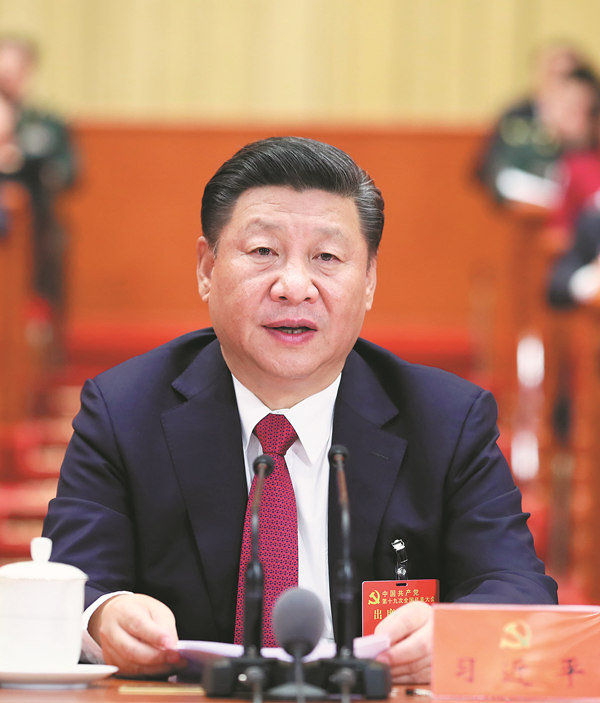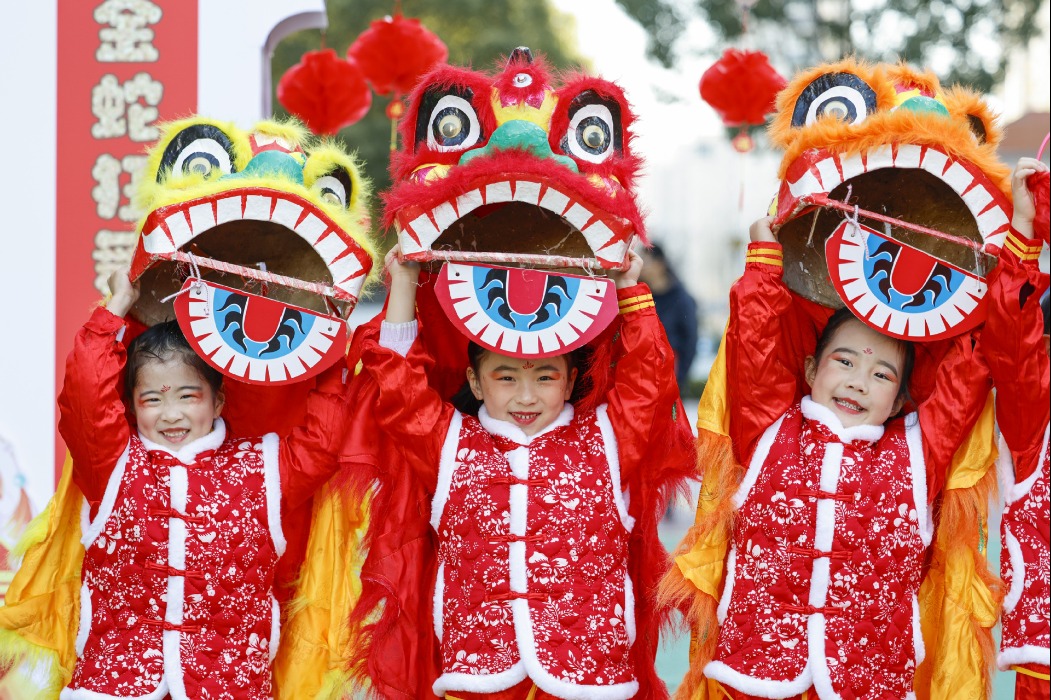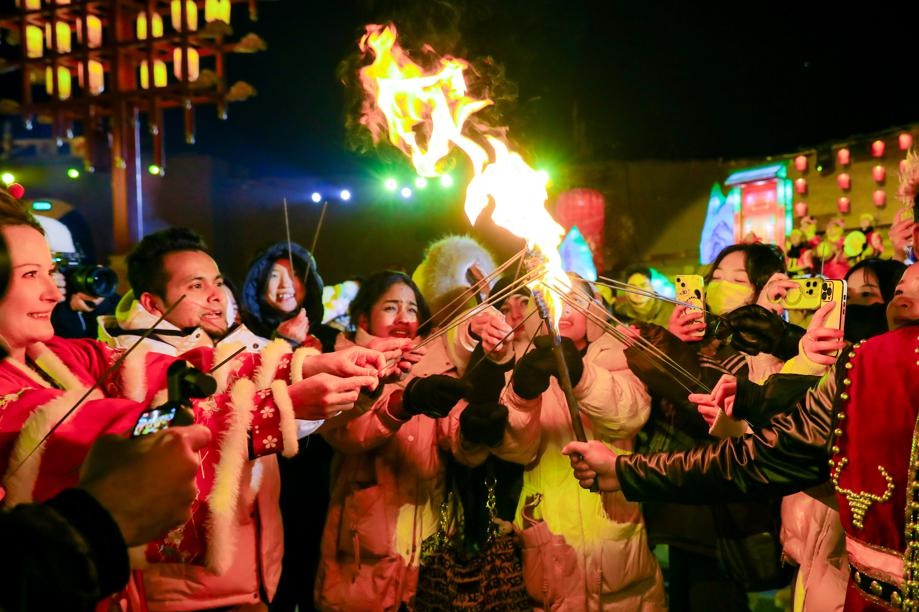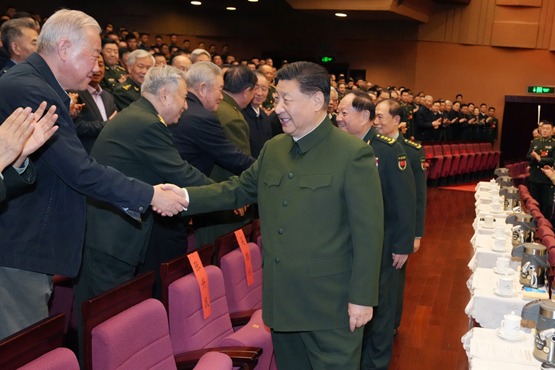19th Central Committee elected, will vote on Political Bureau and general secretary

 |
| Xi Jinping presides over the closing session of the 19th CPC National Congress on Tuesday in the Great Hall of the People in Beijing. LAN HONGGUANG / XINHUA |
The Communist Party of China unveiled its new leadership on Tuesday at a key congress that issued a blueprint for the nation's development for the coming decades.
The new CPC Central Committee, elected by 2,336 delegates and specially invited delegates at the closing session of the 19th CPC National Congress, has 204 members and 172 alternate members.
"The congress elected a new Central Committee of the Party, realizing organizational succession," Xi Jinping said while addressing the closing session.
Xi, also president of China, was elected into the new Central Committee.
Also elected were Wang Huning, Liu Qibao, Xu Qiliang, Sun Chunlan, Li Keqiang, Wang Yang, Zhang Chunxian, Zhao Leji, Hu Chunhua, Li Zhanshu and Han Zheng.
Li Keqiang, 62, was a member of the Standing Committee of the Political Bureau of the 18th CPC Central Committee. The others were all members of the Political Bureau of the 18th CPC Central Committee.
The 19th CPC Central Committee will elect the Political Bureau, the Standing Committee of the Political Bureau and the general secretary at its first plenary session, scheduled on Wednesday.
The congress approved a report of the 18th CPC Central Committee and a work report of the Central Commission for Discipline Inspection. A new Central Commission for Discipline Inspection was also elected at the congress.
The congress formed the major political judgment that socialism with Chinese characteristics has entered a new era, according to a resolution adopted by the congress.
"We must devote great energy to addressing development's imbalances and inadequacies, and push hard to improve the quality and effect of development," said the report, which pointed out that the principal contradiction facing Chinese society has evolved into one between unbalanced and inadequate development and the people's ever-growing need for a better life.
China's socialist system demonstrates great strength and vitality, and the Chinese people and the Chinese nation embrace brilliant prospects, Xi said at the closing session of the congress.
"Our Party shows strong, firm and vibrant leadership," Xi said.
It has been 96 years since the CPC was founded, 68 years since the People's Republic of China was established, and 39 years since reform and opening-up began.
"Living in such a great era, we are all the more confident and proud, and also feel the heavy weight of responsibility upon us," Xi said.
The CPC has united and led the Chinese people in ending "once and for all" the miserable plight of old China, which had been bullied by foreign aggressors following the Opium War of 1840, and in walking completely out of poverty and weakness, Xi said.
He described the congress as one "remaining true to our original aspiration and our mission, holding high our banner, and forging ahead in solidarity".
Xi called on delegates to the congress to study, observe, apply and uphold the Party Constitution, and closely follow the CPC Central Committee in thinking, political orientation and actions.
"In our Party, each and every one of us must always breathe the same breath as the people, share the same future and stay truly connected to them," he said. "The aspirations of the people to live a better life must always be the focus of our efforts."
"We must keep on striving with endless energy toward the great goal of national rejuvenation," he said.
Analysts pointed out that the congress has not only opened a new chapter for China's development for the new era, but also has contributed Chinese wisdom and solutions for the world at a time when global economic growth still faces uncertainties.
Dan Donovan, publisher and managing editor of Ottawa Life Magazine, said China's entering the new era is "the most significant and exciting news of the congress".
"One thing I admire about the Chinese is how they take a very long view of things when they are planning, which is a strength," he said. "Chinese leaders look at how things will be in three and four and five decades from now rather than just four and five and 10 years from now."
If China continues to develop its global trade, follows its Belt and Road program and continues to partner with, and invest in, countries and businesses around the world, everyone will benefit, he added.
B.R. Deepak, a professor at the Center of Chinese and Southeast Asian Studies at Jawaharlal Nehru University in New Delhi, said that China has been steadily contributing to the global governance in the face of increasing disequilibrium among the global economies and the global challenges posed by the traditional and nontraditional security.
The concept of building a community of shared future for the mankind, raised by Xi, envisages common markets, common prosperity even common security in the highly interdependent world, he said.





































